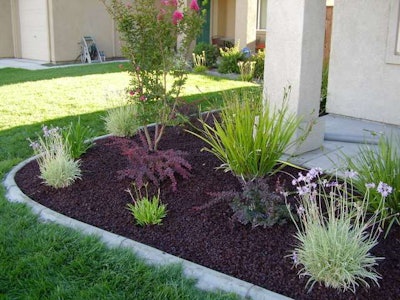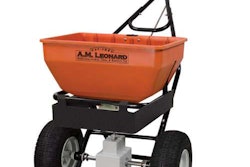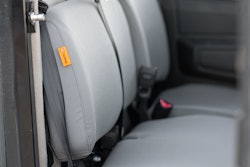 Rubber mulch comes in a variety of colors and some can look similar to wood mulch.
Rubber mulch comes in a variety of colors and some can look similar to wood mulch.Photo: Creative Rubber Works
Americans generate about 290 million scrap tires a year, according to the Environmental Protection Agency. Given all that waste, recycling tires into rubber mulch sounds like a great idea. It has to be environmentally friendly if it’s recycled, right?
Supporters and opponents of rubber mulch are divided into two distinct camps. There isn’t much tolerance on either side toward the other, but it’s time to set the record straight.
Setting aside a client’s personal preference, there are both pros and cons to choosing to add rubber mulch. Let’s break them down according to the most hotly debated issues.
“Impedes weed growth”
One of the main purposes of mulch is to prevent weeds from coming up. Opponents of rubber mulch cite studies showing it is less effective in tree establishment or in controlling weeds compared with wood chips or natural fibers, according to the Washington State University Extension.
In a Consumer Reports test, both rubber and wood chips did equally well, but it mentioned that some weeds grew around the edges, suggesting rubber mulch can get the job done if an adequate layer is applied.
Everlast Rubber Mulch explains in its FAQs that rubber mulch won’t kill weeds that are already in the soil, but it can trap airborne seeds and dehydrate them before they can germinate.
“Permanent or long-lasting”
Some people like to use rubber mulch because it doesn’t need to be replaced as often as wood chips. Most manufacturers boast that their tire mulch lasts at least 10 years.
Clearly, rubber mulch lasts much longer than organic mulches, but there’s a tradeoff: Rubber mulch doesn’t add organic matter to the soil.
Adversaries of rubber mulch like to point out that rubber can and will be broken down by microbes eventually. Even when tires are coated in additives that are toxic to the bacteria, critics say, white-rot and brown-rot fungal species are known to break down those additives.
“Non-toxic”
The concern that comes with the eventual decomposition of tire rubber is the leaching of heavy metals and other chemicals into the soil. Bucknell University has found that rubber leachate is capable of killing algae, zooplankton, snails and fish. Also some studies have shown that high levels of zinc found in rubber can lead to zinc toxicity in plants.
According to the Washington State University Extension, the likelihood of leaching increases the smaller the particles from the recycled tire. EPA has begun researching the possible health effects of using tire rubber, but there’s no conclusive answer on this question as yet.
“Flammable”
Any rubber mulch company that claims its product is not flammable is kidding itself. In the Consumer Reports test, rubber mulch burned much hotter and faster than wood mulch. It was also harder to put out.
Organic mulches are more difficult to ignite and a fire spreads slowly because of their low carbon to nitrogen ratio. Fires need a high carbon ratio to burn hot and spread quickly. If your client lives in an area of high fire risk, do not use rubber mulch, regardless of any other advantages it offers.
“Permeable”
One of the most beneficial characteristics of rubber mulch is the fact that it is highly permeable. It does not absorb any rain water so it allows more water to reach plant roots compared to wood mulch.
“Doesn’t attract bugs”
Another plus of using rubber mulch is that unlike some wood mulches, it does not feed any pests such as termites or carpenter ants. The downside is that it has been found to be the preferred mulch for female and nymphal stage Asian cockroaches.
As you can see, for just about every good reason for using rubber mulch, you can find a dissenter who claims it has no business in the landscape. For now at least, it appears the jury is still out, and the choice of mulch material should be guided by the particular use and location, as well as your client’s preference.









